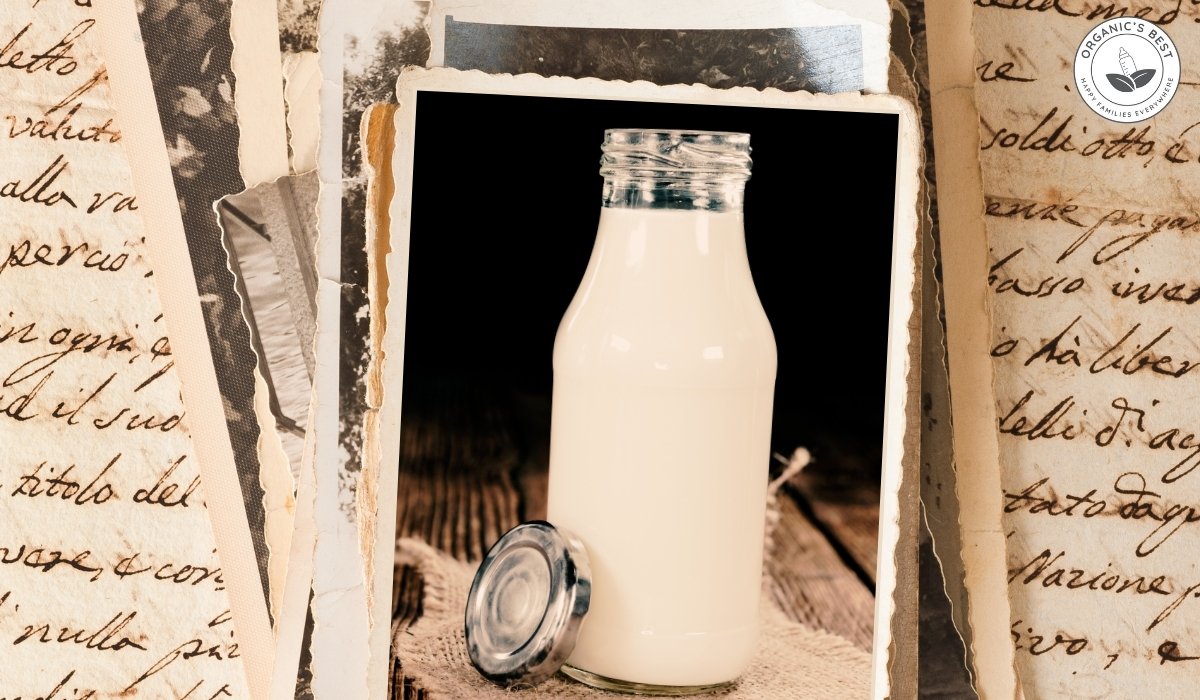Click to Get 2 FREE Boxes/Cans
Only New Customers! Click HERE to Get 2 Extra Boxes/Cans for Free With Your First Order.
BABY FORMULA
Offering new parents top-quality European infant formula from renowned brands like HiPP, Holle, Kendamil, and more. If you’re uncertain about which product to choose, our Formula Finder can help you make the best decision for your baby.
Baby Food
Offering new parents a premium selection of European baby foods, including jars, pouches, cereals, and snacks from esteemed brands like HiPP and Holle.
When Was Baby Formula Invented?
by Agustina Fernandez August 09, 2022 9 min read

Table of Contents
You are probably familiar with infant formula at this point, but have you ever wondered how and where it originated? Each brand has a unique origin story, all stemming from thousands of years ago when the first breast milk alternative was used.
Just like today, there are many reasons why a baby had to be fully or partially formula fed. Historically, there were multiple solutions if a baby could not be breastfed by their mother. From wet nursing to the use of animal milk, parents found innovative ways to nourish their infants.
Keep reading to learn about the origin of infant formula and the history of great brands like HiPP and Holle, who have been feeding happy babies for over 50 years!
The First "Baby Formula" Ever

The use of formula as a breast milk substitute goes way back! Although it wasn't nearly as safe as it is today, as far back as 4000 years ago, women were using alternative milk sources such as animal milk as a replacement for breast milk.
The safest and most common alternative when a mother was unable to breastfeed was wet feeding, a practice where the child would receive human breast milk from another milk producing woman. This became less common as time went on due to the negative way society viewed wet feeding and wet nurses, and it was eventually replaced by the use of baby formula or animal milk as the most common practices.
The most popular source of milk was from a cow, but because this wasn't always readily available, other animal milks such as goat milk, sheep milk, horse milk and donkey milk were also used.
Creation Of Infant Formula
The use of animal milk as an alternative eventually evolved to include synthetic formulas which resemble human milk. In 1865, the first patented infant food entered the market and by 1883 the number of products on the market had skyrocketed. Advances in food preservation allowed formula to become popularized as a convenient, cost effective product, and it still is today!
One of the main differences between early brands of baby formula and modern formula today is the nutritional content. In the mid-1800s, evaporated milk formula was created and sold as one of the first infant foods. However, evaporated milk formulas were high in sugar and fat and weren't ideal for infants.
Early brands would provide infants with the calories they needed but lacked other essential nutrients such as vitamins and minerals. It wasn't until 1929 that the American Medical Association began to monitor the quality of formula, and by 1940, with support from the medical community, baby formula became a mainstream healthy alternative to breastfeeding.
Effects Of Aggressive Advertising And Changing Laws
There has been a conflicting history regarding the debate between baby formula and breast milk and how they both affect the health of a developing baby.
Intense marketing from formula manufacturers led to an overall decrease in breast feeding until the American Academy of Pediatrics (AAP) made a statement explaining how commercial infant foods had negatively impacted the practice of breastfeeding.
Today, the APP still recommends breastfeeding infants from birth until they are 6 months old. This does not mean that formula feeding isn't perfectly healthy and a wonderful substitute for breast milk. Baby formulas today are fortified with an abundance of healthy nutrients to meet an infant's nutritional needs at all stages of development.
Learn more: European Baby Formula Stages Made Simple
Today, baby formula regulations are still being updated as science evolves to better understand infants' nutritional needs. As of February 2020, new EU legislation affects all infant formulas. This new legislation has updated rules surrounding composition changes, nutrition labeling, compliance, and communication.
There are innovative brands on the market who are constantly seeking ways to improve their baby formula recipes and provide parents with infant foods created with top-quality ingredients that are beneficial for both babies and the planet.
The History Of HiPP Formula

One of these innovative brands is HiPP, which, like many successful companies, began with a revolutionary idea. When his wife struggled to nurse, Joseph Hipp began feeding his children cereal made from crushed rusks and milk made at his pastry shop in Pfaffenhofen.
Joseph founded his own company in 1932 and launched HiPP jars in 1959. Eventually, he began taking an interest in organic-biological agriculture, which prompted the ecological evolution of HiPP products.
Today, HiPP has further developed a philosophy that promotes ecological agriculture and sustainable values. Despite its growth over the years, HiPP continued on this path, leading the way in ecological welfare while curating top quality products.
To name just a few of HiPPs eco-accomplishments, they have successfully created a system where 97% of waste is recycled and water and energy consumption have been cut by over 50%.
Learn more: HiPP Formula: German vs. Dutch vs. UK
Their products speak for themselves! Here are a few reasons why they are one of the best formula manufacturers out there:
-
They Only use untreated seeds
-
They produce European certified-organic formulas
-
They use preventive measures to protect plants
-
They Keep livestock according to breed and species
-
They Prohibit the use of mineral nitrogen fertilizers
-
Hormones are prohibited in their products, and antibiotics are only permitted when necessary for animal health
-
Their products are free of GMOs, artificial colors and preservatives, aromas or flavor enhancers
The History Of Holle Formula

Another one of our favorite brands is Holle. Holle was founded in 1933 in Arlsheim, making them not only one of the first organic baby food manufacturers in all of Europe, but also one the first certified Demeter companies on the market.
Holle creates clean biodynamic baby food that is packed full of nutrients. Initially Holle products were only available in Switzerland, but due to popular demand their products are now enjoyed all over the world!
Learn more: Where is Holle Formula Made: The Origin of Quality Nutrition
Holle, being a pioneer of organic baby products, took it a step further by prioritizing sustainable practices within their company. Since 2016, all Holle baby porridges and milk cereals and goat milk products are CO2e neutral. This means that Holle has been offsetting their carbon footprint while still producing high quality, delicious products for your little ones!
You can feel good supporting a company that prioritizes the health of your baby and the environment. Here are a few more reasons to love Holle:
-
Highest Organic Standards in Europe: Demeter
-
Made with Premium quality milk from happy cows
-
Made with Simple ingredients that support healthy development
-
They prioritize Chemical & hormone-free agriculture and manufacturing
-
Holle’s formulas are free of artificial sweeteners and GMOs.
The History Of Kendamil Formula

Kendamil is another top-quality formula manufacturer that relies on a local supply chain to source ingredients for their products.
Sourcing ingredients from the English Lake District holds the company accountable during every step of the process and allows them to support local family farmers. Founder Ross McMahon emphasizes the importance of animal welfare while relying on ingredients that are close to nature.
Kendamil is unique! They are the only British baby milk brand, manufactured entirely in Britain. Their products are formulated with breast milk in mind and use full cream nutrients to pack their products full of milk fats to provide a growing baby with energy.
There are so many reasons to nourish your little one with Kendamil formula. Here are a few reasons that we love their products:
-
They are EU Organic & Red Tractor Certified
-
They use ARA (Omega-6) & plant-based DHA (Omega-3)
-
They are Vegetarian-friendly
-
Many of their products are enriched with prebiotics
-
They use a breastmilk-like formulation
-
Their products are free from soy, gluten, and palm oil
-
Their products are made without the use of harmful chemicals, pesticides, antibiotics, or GMOs
New European Brands

While HiPP, Holle, and Kendamil each have over 50 years of experience behind them, there are newer brands with products on the market that are worth mentioning when discussing high-quality infant formula. Each of these companies has a compelling or unique way of creating its products, and many parents love it!
Jovie Goat Milk Formula
If you are interested in a goat milk formula, then Jovie is for you! Jovie is a Dutch brand that makes products from full-fat goat milk. They consist of a team of experts and parents who thrive to make a product that they are proud of, one that consists of quality, nutritious ingredients.

They are one of the few brands on the market that exclusively use goat milk in their formulas. Goat milk is a great alternative to breast milk or cow's milk. It is known for its many nutritious qualities, one of which is that it is digested up to 2x faster than cow's milk.
Here are a few reasons you will love their products:
-
Their products are EU organic-certified
-
Their formulas are easier to digest
-
Their formulas are less allergenic
-
Their products contain only whole goat milk without maltodextrin or palm oil
-
Their formulas are enriched with prebiotics
-
They are made without the use of harmful chemicals, pesticides, antibiotics or GMOs
Lebenswert Bio
We told you about Holle above, but have you heard about Lebenswert Bio, their sister company? This company was introduced to the European market in 2009 and has skyrocketed in popularity since.
If you are already a fan of Holle, you can expect the same great quality in Lebenswert Bio's products. Lebenswert Bio was created to offer parents a more cost-effective formula that did not compromise on quality or taste.

Lebenswert Bio does not cut corners when it comes to producing top-quality, budget-friendly formulas. Here are a few more reasons to love them:
-
They only use untreated seeds when producing ingredients
-
They use preventive measures to protect plants
-
They use natural compost in place of chemical or synthetic agents
-
Hormones are prohibited, and antibiotics are only permitted when necessary for animal health
-
Made with simple ingredients that support development
-
Made with premium quality milk from happy cows
Löwenzahn Organics
Löwenzahn Organics is one of the newer brands on the market, which was founded by two moms in Germany. As parents themselves, they strived to make a formula that would support the healthy development of infants. They focus on gut health, believing this is the most important part of determining a baby’s physical and mental development.

Although they are new, there is so much to love about this brand, such as:
-
Their products are EU organic-certified
-
Many products contain ARA (Omega-6) & plant-based DHA (Omega-3)
-
Many products are enriched with prebiotics
-
Breastmilk-like formulation
-
They are made without harmful chemicals, pesticides, antibiotics or GMOs
Breastfeeding & Formula-Feeding
Women have been breastfeeding since the beginning of civilization, but there have always been cases where this is not possible. Humans have come up with innovative ways to nourish infants, such as wet nursing, using cow or goat milk, and creating synthetic formulas meant to resemble human milk.
While formula has not always been what it is today, since 1980, The Infant Formula Act allowed the Food and Drug Administration to monitor and control the quality of formula. This ensures that when being fed formula, your infant is receiving nutrients such as fats, proteins, vitamins C, A, D, E, K, B1, B2, B6, and B12, calcium, iron and more!

While formula-fed infants are being given all the yummy ingredients they need to support their growth and development, pediatricians recommend exclusively breastfeeding your little one for the first 6 months.
Conclusion
There is an extensive history behind infant formula, and manufacturers have come a long way to ensure your growing baby is getting all the nourishment they need as they progress from infant to toddler. You can feel good feeding your little one formula, knowing that the science behind it is constantly being updated, and regulations are continuously being put into place to ensure the health of growing babies all over the world. A key takeaway is that modern formulas are safe and nutritionally adequate for babies when breastfeeding is not feasible or insufficient!
More Helpful Formula Guides!
-
HiPP vs Holle
- Holle Formula vs. Enfamil Organic
- Nannycare VS Holle Goat Formula
- Best Formula for Colic
- Best Formula for Sensitive Stomachs
Disclaimer:
Please be aware that this information is based on general trends in babies, and it is not medical advice. Your doctor should be your first source of information and advice when considering any changes to your child’s formula and when choosing your child’s formula. Always consult your pediatrician before making any decisions about your child’s diet or if you notice any changes in your child. Breastfeeding is the best nutrition for your baby because breast milk provides your child with all the essential nutrients they need for growth and development. Please consult your pediatrician if your child requires supplemental feeding. |
Agustina Fernandez
Dr. Agustina Fernandez earned her medical degree from the prestigious Universidad Nacional de Córdoba, Argentina. With a deep-rooted passion for pediatrics, Dr. Fernandez is currently on the path to specializing in children's healthcare. Recently, she has delved into the vital field of infant nutrition. Her research interests include breastfeeding, infant formula, and baby food in little ones’ formative years. Dr. Fernandez's commitment to this area of study underscores her dedication to ensuring the health and well-being of children from their earliest days.
Leave a comment
Comments will be approved before showing up.
Also in Organic Infant Nutrition and Health Blog

10 Winter Activities for Kids and Toddlers
by Agustina Fernandez January 06, 2026 8 min read
Read More
How to Choose The Best Infant Formula: A Guide to EU Organic Formulas
by Agustina Fernandez January 05, 2026 14 min read
Read More
Best Formula for Breastfed Babies 2026 Guide
by Agustina Fernandez January 05, 2026 15 min read
Read More
Reviewed by Dr. Bardha Citaku, MD
-

Dr. Bardha Citaku: Medical Reviewer of Organic's Best Blog
Dr. Bardha Citaku completed her medical studies at the University of Prishtina in Kosovo, where she began her journey into the field of medicine. She has since developed a career in medical research, contributing to projects with notable organizations, including the World Health Organization (WHO).
